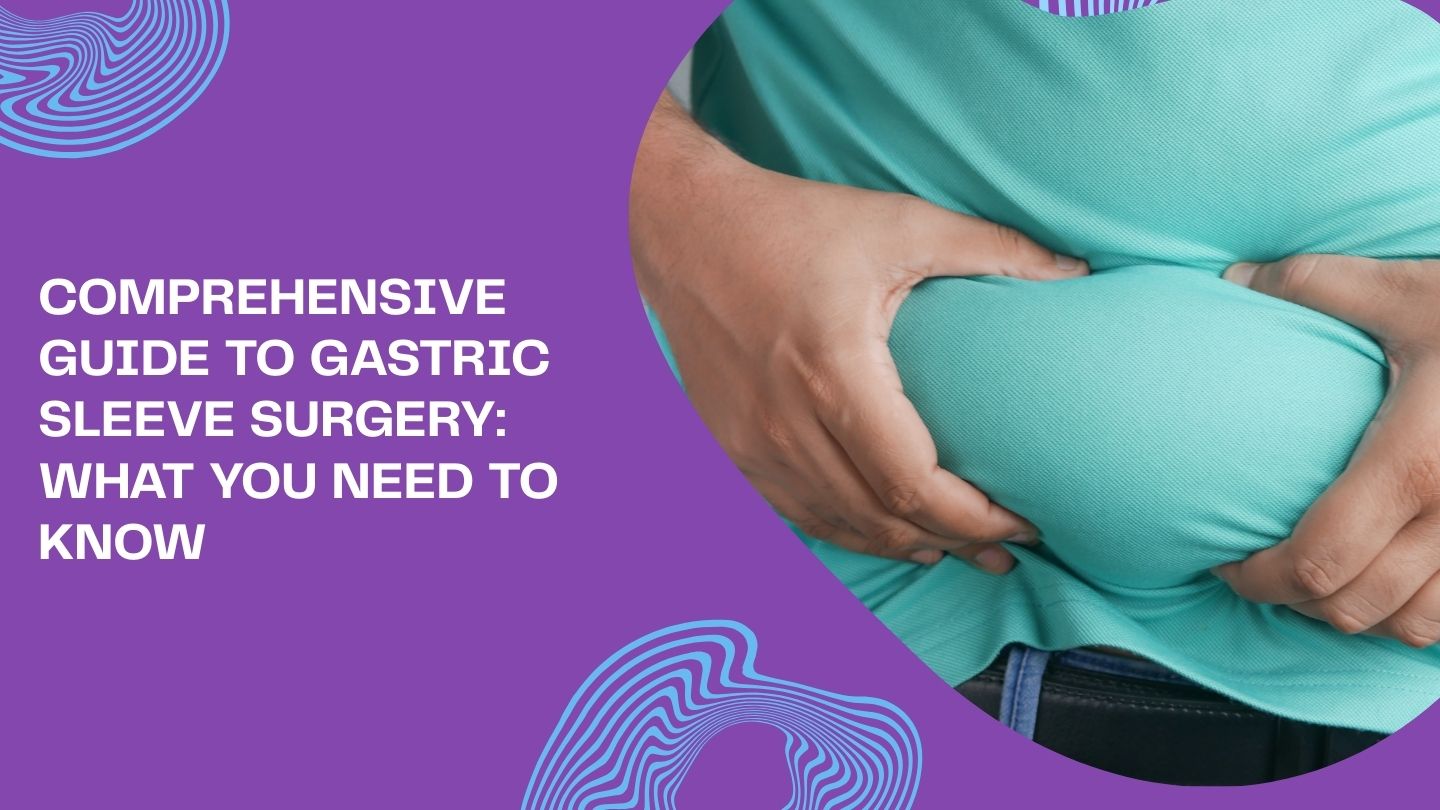
Comprehensive Guide to Gastric Sleeve Surgery: What You Need to Know
Gastric sleeve surgery is a highly effective weight loss procedure that removes a significant portion of the stomach to help control appetite and limit food intake. This approach supports lasting weight reduction and can improve conditions such as type 2 diabetes, high blood pressure, and sleep apnea. Success depends on careful preparation, dietary discipline, and long-term lifestyle changes. In this blog, we detail the procedure, its benefits, potential risks, and what to expect before and after surgery.
Key Takeaways
- Gastric sleeve surgery involves the removal of about 80% of the stomach, promoting weight loss and reducing appetite through hormonal changes.
- Eligibility for the surgery typically requires a BMI of at least 35, or a BMI of 30-34 with related health issues, along with a commitment to lifestyle changes.
- Post-surgery, patients must adhere to a strict diet and regular exercise regimen to maintain weight loss and prevent nutritional deficiencies.
What is Gastric Sleeve Surgery?
Gastric sleeve surgery, also known as a sleeve gastrectomy, is a type of weight loss surgery that involves removing about 80% of the stomach. This procedure results in a smaller stomach, significantly reducing its capacity and therefore the amount of food one can consume. This surgical intervention not only limits food intake but also decreases appetite by reducing the production of hunger hormones in the stomach. Sleeve gastrectomies not only promote weight loss but also improve overall health outcomes.
The surgical process typically employs minimally invasive techniques, such as laparoscopic or robotic surgery, which involve small incisions and the use of a laparoscope. These advanced methods contribute to quicker recovery times and less postoperative pain, making sleeve gastrectomy an attractive option for those struggling with obesity.
Why Consider Gastric Sleeve Surgery?
Gastric sleeve surgery can be a life-changing decision for those who have struggled to lose weight through traditional methods. One of the most compelling reasons to consider this weight loss surgery is the significant improvement in health conditions such as diabetes and sleep apnea. The procedure has been shown to alleviate symptoms of these and other obesity-related diseases, offering a new lease on life for many patients.
For individuals who have not found success with dieting, exercise, or other non-surgical weight loss methods, gastric sleeve surgery provides an effective alternative. The procedure is often recommended for patients who have a body mass index (BMI) of at least 35, or a BMI of 30 to 34 accompanied by obesity-related health issues. This makes it a suitable option for a wide range of candidates, including those considering bariatric sleeve surgery.
Moreover, the risks associated with gastric sleeve surgery are generally lower compared to the risks of living with severe obesity. The surgery can help mitigate the dangers of obesity-related conditions, making it a safer option for long-term health and well-being. For many, the benefits of improved health and quality of life far outweigh the risks of the surgical procedure.
Eligibility Criteria for Gastric Sleeve Surgery
Determining eligibility for gastric sleeve surgery involves several factors, primarily centered around the patient’s BMI and the presence of obesity-related health conditions. Generally, suitable candidates include:
- Individuals with a BMI of at least 35.
- Individuals with a BMI of 30 to 34 who have accompanying health issues such as diabetes or hypertension.
- Individuals with a BMI of 40 or higher, who are typically eligible regardless of other health conditions.
There are weight limitations for the surgery due to hospital equipment constraints. Candidates must weigh less than 450 pounds to determine how much weight the procedure can safely and effectively handle. This criterion helps maintain the safety and feasibility of the surgery, ensuring the best possible outcomes for patients. Patients comparing procedures benefit from understanding the key differences between lap band and gastric sleeve surgery to make informed choices about the safest and most effective weight loss approach.
In addition to BMI and weight considerations, candidates must also demonstrate a commitment to making significant lifestyle habit changes. This includes adhering to a medically supervised weight loss program prior to surgery, which is often a requirement by many insurance plans. These preparatory steps are crucial for ensuring that obese patients are fully prepared for the surgery and its aftermath, especially in cases of morbid obesity and excess body weight, as they work towards achieving a healthy weight.
Pre-Surgery Preparation
Before undergoing gastric sleeve surgery, patients must go through a thorough preparation process. The journey typically begins with a referral from a primary care provider, which initiates the evaluation process for bariatric surgery. This step is crucial as it ensures that the patient is a suitable candidate for the procedure and understands the commitment required.
Many insurance plans require patients to participate in a period of medically supervised weight loss before the surgery, usually lasting three to six months. This period helps patients demonstrate their commitment to the weight loss journey and prepares them for the lifestyle changes ahead. Additionally, patients are typically advised to start a pre-surgery diet about three weeks before the procedure to reduce liver fat and ensure safer surgical access.
In the final days leading up to the surgery, patients must switch to an all-liquid diet, consuming only clear liquids for two to three days. This stringent dietary protocol helps minimize complications during the surgery. Patients must stop taking certain medications, such as NSAIDs and herbal supplements, to avoid adverse effects during the procedure.
Patient education plays a vital role in pre-surgery preparation. Understanding the surgery, its benefits, risks, and the necessary lifestyle changes post-surgery is crucial for long-term success. This comprehensive preparation ensures that patients are well-informed and ready for the transformative journey ahead.
How Gastric Sleeve Surgery is Performed

Gastric sleeve surgery is typically performed using minimally invasive surgical techniques, which are associated with less pain and faster recovery times. The procedure involves:
- Making several small incisions in the abdomen
- Inserting a laparoscope and other surgical instruments through these incisions
- Using the laparoscopic approach to provide a clear visual feed of the operation
- Allowing the surgeon to perform the surgery with precision
The primary step in the surgery is the removal of more than half of the stomach, leaving behind a sleeve-like structure. This significantly reduces the stomach size, aiding in substantial weight loss. The entire procedure usually takes between 60 and 90 minutes and is performed under general anesthesia to ensure the patient is unconscious and pain-free. Understanding the surgical timeline is easier with insights into how long a gastric sleeve surgery takes, which explains typical procedure lengths and recovery expectations for different patients.
Minimally invasive techniques like laparoscopic sleeve gastrectomy or robotic surgery offer quicker recovery times and less postoperative discomfort. These advanced methods make the surgery more accessible and manageable for patients, contributing to its growing popularity as a weight loss solution.
Immediate Post-Surgery Expectations
Following gastric sleeve surgery, patients can expect:
- To stay in the hospital for one to two days as they begin their recovery.
- Pain management is a critical aspect during this period, with regular oral medications provided to maintain comfort.
- To be initially restricted to small amounts of soft foods and liquids for about a month.
- To gradually transition to more solid foods as their recovery progresses.
Common symptoms immediately after surgery include fatigue, nausea, and light-headedness. Monitoring for signs of dehydration, such as dark urine and persistent fatigue, and maintaining hydration by taking small sips of water regularly, is crucial. Light physical activity, like walking, is encouraged shortly after surgery to promote circulation and aid in recovery.
Patients are advised to avoid strenuous activities and heavy lifting for several weeks to prevent complications and allow proper healing. Changes in bowel habits, including constipation or diarrhea, are also common and should be managed with the guidance of a healthcare provider. By following these guidelines, patients can ensure a smoother and more effective recovery process. Awareness of possible digestive changes, such as understanding dumping syndrome after gastric sleeve surgery, allows patients to plan meals carefully and avoid discomfort during the early recovery period.
Long-Term Recovery and Lifestyle Changes
Long-term recovery after gastric sleeve surgery requires significant lifestyle changes and a commitment to maintaining a healthy diet and regular exercise. Initially, patients will:
- Begin with a liquid diet
- Gradually transition to solid foods, prioritizing protein intake to aid in healing and weight maintenance
- Chew food thoroughly
- Stop eating when they feel hungry to help avoid complications
Vitamin and mineral supplements are a lifelong necessity to prevent deficiencies. Patients should:
- Focus on nutrition-rich food choices
- Avoid sweets, fatty foods, and alcohol, which can be rapidly absorbed and pose risks post-surgery
- Avoid smoking permanently, as it can hinder recovery and overall health
Regular exercise, at least 30 minutes a day, is crucial for maintaining weight loss and overall health. Continual medical follow-ups, with yearly visits to a bariatric specialist, are recommended to monitor progress and address any potential nutritional deficiencies or other health concerns. This lifelong commitment to health and wellness is essential for the success of gastric sleeve surgery. Maintaining balanced nutrition is supported by guidance on the importance of protein intake after gastric sleeve surgery, highlighting how adequate protein aids healing, preserves muscle mass, and supports lasting weight control.
Benefits of Gastric Sleeve Surgery

Gastric sleeve surgery offers numerous benefits:
- Patients typically lose an average of 60% to 70% of their excess weight within two to three years.
- This significant weight loss leads to improvements in obesity-related conditions, such as diabetes and sleep apnea, enhancing overall health and quality of life.
- The reduction in hunger hormones results in decreased appetite, making it easier for patients to maintain their new, healthier lifestyle.
Many patients report an enhanced sense of well-being and improved quality of life after the surgery. Most patients find that the bariatric procedure is quicker and simpler than other bariatric surgeries, contributing to better recovery experiences and making it a favorable choice for many bariatric procedures performed, resulting in fewer complications. Metabolic and bariatric surgery is often considered for those seeking significant weight loss.
The combined benefits of effective weight loss and improved health conditions, including managing high cholesterol, make gastric sleeve surgery a valuable option for those struggling with obesity.
Maintaining Weight Loss After Surgery

Maintaining weight loss after gastric sleeve surgery requires a lifelong commitment to dietary and lifestyle changes, including:
- Following a diet rich in enough protein to aid healing and sustain weight loss
- Making nutrition-focused food choices
- Incorporating permanent vitamin intake to prevent deficiencies
Regular exercise is vital for long-term weight loss success. Patients should stay active and monitor their weight loss progress, related health conditions, and any side effects. By adhering to these lifestyle guidelines, patients can induce weight loss and maintain their weight loss for 10 years or more after the surgery. Addressing slow or stalled progress early is critical, and recognizing factors behind why I am not losing weight after gastric sleeve surgery helps patients adjust lifestyle habits and maintain steady results.
Moving Toward a Healthier Future
Gastric sleeve surgery is a proven, long-term solution for individuals seeking meaningful weight loss and relief from obesity-related health concerns. Reducing stomach size and controlling appetite helps improve metabolic health, lowers the risk of chronic diseases, and supports a more active lifestyle. Lasting success depends on comprehensive preparation, dedicated follow-up care, and a lifelong commitment to balanced nutrition and exercise.
At Wellstar Comprehensive Bariatric Services, we specialize in guiding patients through every step of gastric sleeve surgery in Cobb County, Marietta, Smyrna, LaGrange, West GA, and Austell. Our team provides personalized treatment plans, compassionate support, and expert care to help you achieve sustained weight loss and improved well-being. Contact us to begin your journey toward a healthier, more confident life.
Frequently Asked Questions
Who is a good candidate for gastric sleeve surgery?
Ideal candidates typically have a Body Mass Index (BMI) of 35 or higher, or a BMI of 30–34 with obesity-related conditions such as diabetes or hypertension. Candidates must also demonstrate a commitment to long-term lifestyle changes, including diet, exercise, and regular medical follow-ups.
How much weight can I expect to lose after surgery?
Most patients lose around 60% to 70% of their excess weight within two to three years. Actual results depend on adherence to dietary guidelines, physical activity, and consistent post-surgery care.
What is the typical recovery time after gastric sleeve surgery?
Recovery usually takes about two to four weeks. Patients begin with a liquid diet, transition to soft foods, and gradually move to regular foods while slowly increasing physical activity to enhance healing and maintain weight loss.
Will I need to take vitamins and supplements after the procedure?
Yes. Lifelong vitamin and mineral supplementation is necessary to prevent nutritional deficiencies caused by the reduced stomach size and decreased nutrient absorption. Common supplements include multivitamins, calcium, vitamin B12, and iron.
Are there long-term dietary restrictions after gastric sleeve surgery?
Patients should permanently limit high-fat, high-sugar foods and alcohol. Eating small, protein-focused meals and avoiding overeating are essential for maintaining results and supporting healthy digestion.
